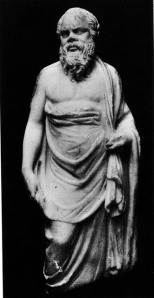


The individual that we have chosen as our Individual in History is Socrates. Socrates was a classical Greek philosopher that lived between 480 B.C- 399 B.C. When Socrates was an adult he went around Athens asking people questions like, “What is truth,” “What is love,” etc. After a few years he had a group of followers and, one student Plato whose work helps us know the teaching of Socrates.
Socrates maybe on of the most influential people in history because his ideas about epistemology, education and ethics laid the foundation for western philosophy and culture.
Socrates was known manly for his philosophy. One thing that shaped Socrates’ philosophy is what is now known as epistemology, but was not talked about at the time of Socrates. Epistemology is the philosophy of how we know what we know. Socrates believed that we already have inside of us all the knowledge that we need and should look inside ourselves to find that knowledge. This idea went against the religion of that time that taught that knowledge came from the gods.
His views on knowledge and how people learn influenced Socrates’ views on education, especially what happens between teacher and student. Socrates introduced one-on-one education as an essential form of teaching. The main teaching style used in the time of Socrates was lecturing, which had one teacher teaching to a room full of students. But, Socrates had a different way of teaching that has come to be known as the Socratic Method, with a teacher asking a question to the student to get the student to answer their own questions. Most education in America today is lecture, but this does not help students develop their own thoughts. Though many schools find this method too expensive to use, and not easy for public schools, most teachers still want to help students learn by asking questions.
Another thing Socrates is know for is his teaching on ethics. Simply put, ethics is the moral life or how one should live life in society and our personal life. Plato wrote about this at great lengths in a dialogue between Socrates and a group of students in Plato’s Republic. Socrates believed that the only way to proceed to the after life is to live a pure moral life. In the time of Socrates, a person’s morality was judged by what they did on the outside, but Socrates believed that true morality was based on the soul of the person and not just on the actions. A morally pure life was to act on what you believed was the right thing to do. This is one of his biggest legacies since most of what we believe about morality now is also judged by motives and not just actions.
Socrates wrote no books of his own, but his student and biographer, Plato, wrote most of Socrates’ work. One of works was The Symposium where Socrates defines love. The second is a dialog on the perfect society, in Plato’s Republic. He also developed the Socratic Method, where the questioner explores the implications of others’ positions to stimulate rational thinking and illuminate ideas. He was one of the first people in Greece who tried look at himself for truth and not at the Gods for the truth.
Socrates’ was tried in an Athenian court for corrupting the youth, for refusing to recognize the gods . The prosecutors asked for the death penalty. Socrates agreed that if he was corrupting the youth and not recognizing the gods, then he should be put to death. So by vote, he was sentenced to drink poisoned hemlock and thus dying. This was the end to one of the greatest minds who ever lived.
Socrates not only taught many students of his own day, but taught Plato, who taught Aristotle, who taught Alexander the Great. Whether it is through his direct influence or continued indirect influence through university classes today, the philosophy and teaching of Socrates makes him one of the most influential people to have ever lived.